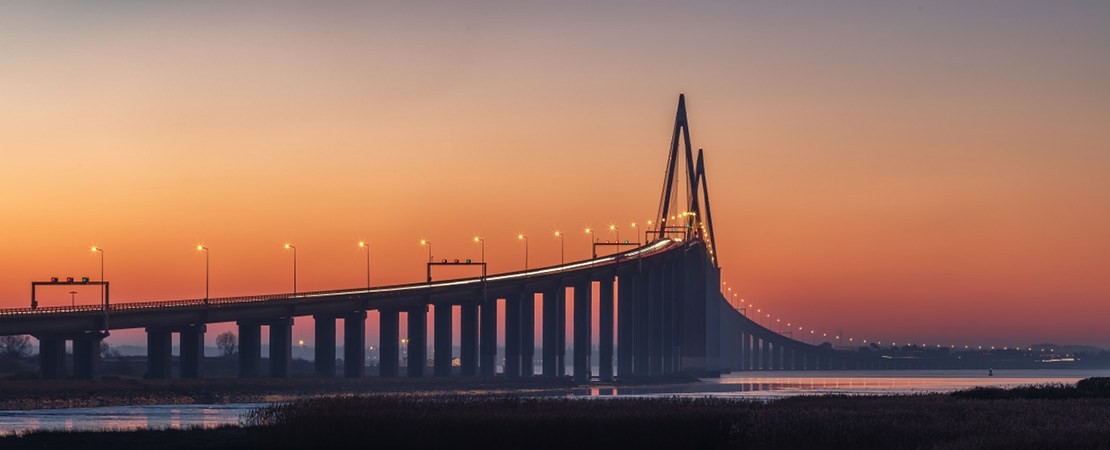Bridges to admire and cross along La Loire à Vélo
-
D.Darrault

-
Pont St Nazaire © Didier - stock.adobe.com

The Loire à Vélo cycle route offers an opportunity to explore all the wonders of this unspoiled river. With its breath-taking flora and fauna, the Loire River will amaze you as you travel along it. This route is also well known for its exceptional built heritage. The numerous châteaux of the Loire obviously come to mind, but you will also come across other equally impressive constructions: the bridges. More than 40 bridges span the Loire and connect towns to each other.
The bridges of the Cher – Near the start of La Loire à Vélo
The Port-Aubry viaduct
The commune of Bannay in the Cher region and the commune of Cosne-Cours-sur-Loire in the Nièvre region are connected by the Port-Aubry viaduct. A metal rail bridge 40 metres high and 828 metres long! It was in 2000 that the last goods train crossed this bridge. Today, it is still possible to cross it via the “cyclorail du Sancerrois”. You will board a velorail for a 6.5 km journey from Cosne-Cours-sur-Loire to Sancerre. An original activity for the whole family which promises to be exciting!
The bridge of Cosne-Cours-sur-Loire in Boulleret
Another bridge connects the Cher and the Nièvre departments! It’s the suspension bridge of Cosne-Cours-sur-Loire, which links the communes of Boulleret in the Cher, and Cosne Cours-sur-Loire in the Nièvre. It was in 1833 that the Berry and Nièvre banks of the Loire were linked by a bridge for the first time. From this steel suspension bridge, you will have a clear view of the Loire.
The bridges of the Loiret
The Briare aqueduct
The Briare aqueduct is an impressive construction, built of iron and stone and 662 metres long. Built by a certain company named “Eiffel”, it is the oldest aqueduct in France. At the time, it allowed barges to move between the Berry canal and the Briare canal. Today, small pleasure craft and barges still cross the Briare aqueduct, perhaps you will witness one of their crossings or cross it yourself by boat… What’s more, crossing the Briare aqueduct, also possible on foot or by bike, will offer you a unique view of the Loire!

The Viaduct of Sully-sur-Loire
The Viaduct of Sully-sur-Loire is a former railway bridge which connects the towns of Sully-sur-Loire and Saint-Père-sur-Loire. It was converted to a bridge entirely for cyclists and pedestrians in April 2020. Along the La Loire à Vélo route, you will appreciate this safe crossing while enjoying a magnificent view of the château of Sully-sur-Loire.

The George-V bridge and the Bridge of Europe in Orléans
In Orléans, there is a generational clash. The George-V bridge, the oldest bridge in Orléans, was built between 1751 and 1760. This imposing stone bridge has witnessed the history of the city first-hand. Today it supports a tramline, a road and a cycle track. To the west of the George-V bridge is the Bridge of Europe. This bridge referred to as a “bowstring arch bridge”, with its modern look, was built between 1998 and 2000 and spans the Loire between Orléans and Saint-Jean-de-la-Ruelle to the north and Saint-Pryvé-Saint-Mesmin to the south. Its immense tilted arch will impress you and make you feel very small as you cycle underneath it across the pedestrian-cycle track.
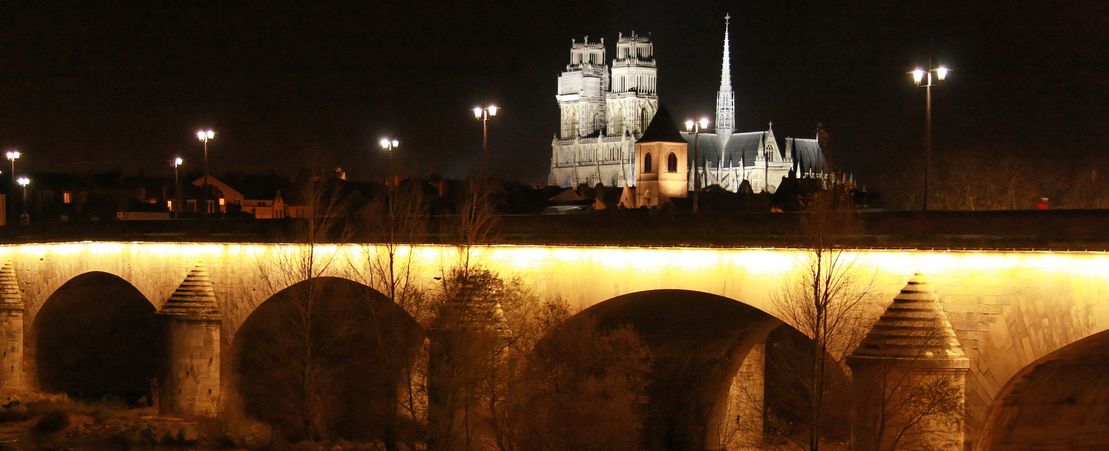
The Beaugency bridge
The Beaugency bridge spans the Loire to connect the commune of Beaugency to the commune of Lailly-en-Val. This stone bridge was built in the 14th century, and in the course of history has undergone numerous repairs which has turned it into an atypical construction, which you need to take time to observe. According to the legend of the Beaugency bridge, the devil helped to construct it and, as payment, he demanded the soul of the first passer-by to cross his bridge… The inhabitants of Beaugency sent a cat, which was the only victim. On your way through, take advantage of the opportunity to visit the château of Beaugency which has just reopened.
The Loir-et-Cher bridge
The Jacques Gabriel bridge in Blois
The Jacques Gabriel bridge is a major element of Blois architectural heritage, and was constructed between 1716 and 1724. During the Second World War the Jacques Gabriel bridge was a strategic location which was destroyed many times. The first time, in 1940, when the French army used the bridge to halt the German advance by blowing up its 10th arch, then a second time, in 1944, when the Germans retreated and destroyed the three central arches. In 1946, reconstruction work was carried out and it was restored to its former glory.
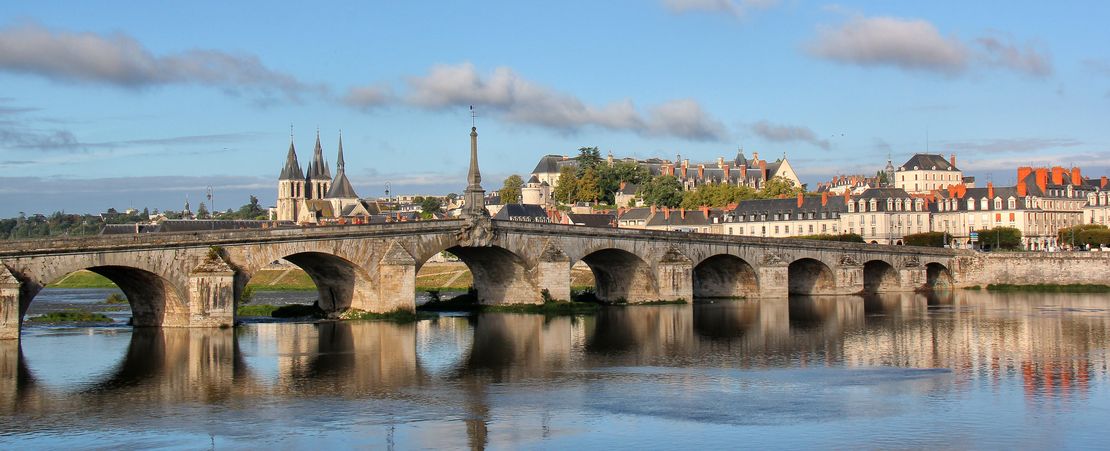
The bridges of Indre-et-Loire in Touraine
The Saint-Symphorien bridge in Tours
The Saint-Symphorien bridge in Tours, is a suspension bridge for pedestrians and cyclists. Nicknamed “the wire bridge” by the inhabitants of Tours, the Saint-Symphorien offers an unusual way of travelling through Tours, while enjoying a beautiful view of the Loire! In the evening: the suspension bridge is illuminated in colour, a “wow” effect not to be missed during your visit to Tours.
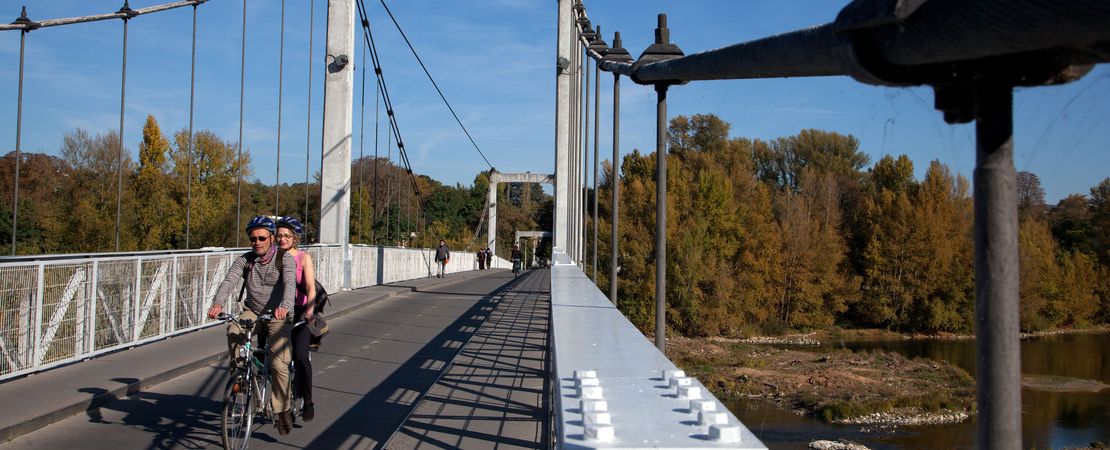
The Wilson bridge in Tours
The Wilson bridge in Tours is one of the city’s major edifices. It is lit up every evening, and from May to October the traditional Tours-sur-Loire open-air café is set up next to this stone bridge, for lively evenings. From the riverside you can enjoy a beautiful view of the bridge and the Loire.
The Langeais suspension bridge
The town of Langeais, a typical Touraine town between Tours and Saumur, has an imposing suspension bridge. This remarkable structure will impress you with its arched pillars, embellished with turrets. It was built on the orders of King Louis Philippe in the 19th century and has suffered damage on numerous occasions caused by bad weather and the fast flowing waters of the Loire. In 1940, during the war, the bridge collapsed… Today, thanks to the Langeais suspension bridge, you can cross the Loire by bike, on foot or by car. The view of the bridge from the grounds of the château de Langeais is breathtaking!
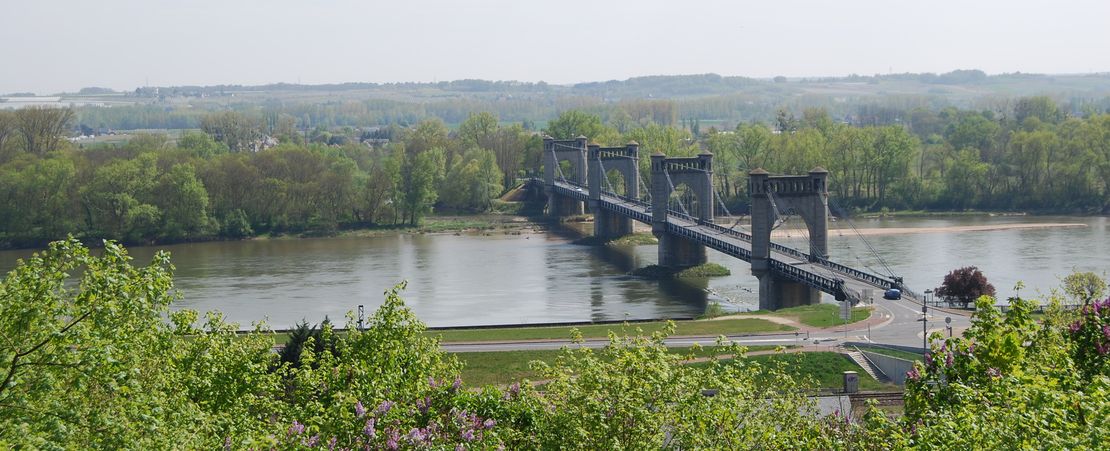
The bridges of Maine-et-Loire
The Cessart bridge in Saumur
The Cessart bridge in Saumur has 12 arches and is 276 metres long. It is one of the oldest bridges in the Loire Valley. Renamed in 1926 after changing names several times, it now bears the name of its engineer, Monsieur Cessart. A real technical feat at the time and a necessary passageway between the north bank and the south bank of the Royal River, it serves the island of Offard, in the middle of the Loire.
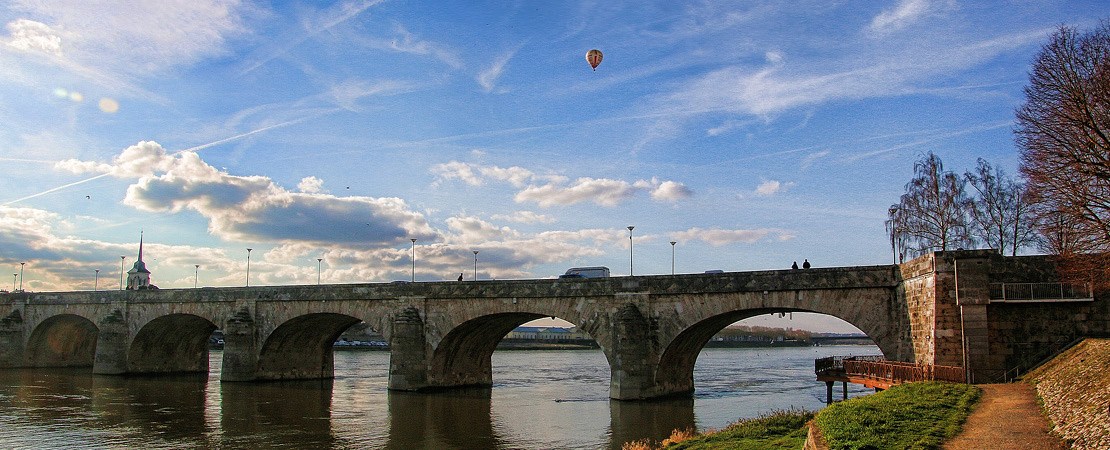
The Verdun bridge in Angers
This bridge is the oldest thoroughfare from one bank of the Maine to the other and connects Angers city centre to the district of la Doutre. Built in the Middle Ages, the Verdun bridge is familiar with war: in summer 1944, its arches on the Doutre side were destroyed during the fighting for the Liberation. The bridge was restored and completed in 1946. When night falls, the current lighting of the bridge showcases the Royal River… A majestic sight!
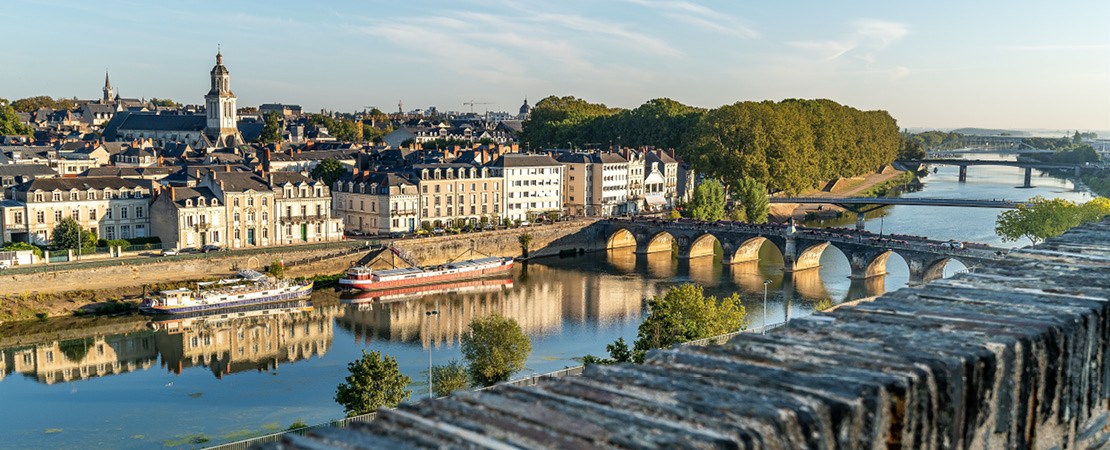
The Bouchemaine bridge
The Bouchemaine suspension bridge links Saint-Gemmes-sur-Loire to Bouchemaine on La Loire à Vélo. It was constructed in 1910 then reconstructed at the end of the Second World War after being bombed.
Today, it is used by many cyclists following the route, who can see toues de Loire on either side of the bridge, boats which are emblematic of the region.
The Ancenis bridge or the Bretagne Anjou bridge
The first suspension bridge over the Loire dates back to 1839, and it’s the one which leads to Ancenis! The suspension bridge crosses the Loire from the north bank, to Orée d’Anjou on the south bank. It measures 467 metres in length and 28.7 metres in height, 1500 tonnes of steel in total! Before the bridge you see today, four others crossed from the north bank to the south bank, the first having been built between 1837 and 1839.

The bridges of Loire-Atlantique
The Bellevue bridge
The Bellevue (or Belle Vue) bridge offers a panoramic view of the Loire, the balade Bellevue, the sand banks of Basse-Goulaine and the île Clémentine: a typical Loire landscape! Not far away, you will arrive – on the way there or the way back – in Bellevue, which in times past was lined with cafés, open-air cafés and leisure facilities all along the promenade.
The Mauves-sur-Loire bridge
Created in 1882 with grey Eiffel girders, the Mauves-sur-Loire bridge is today brand spanking new! 482 metres in length, and with 2 metres on either side of the road dedicated to bicycles, it’s only waiting for you, cyclotourists! Located between Mauves-sur-Loire (right bank) and Divatte-sur-Loire, it crosses the main branch of the Loire to the north.
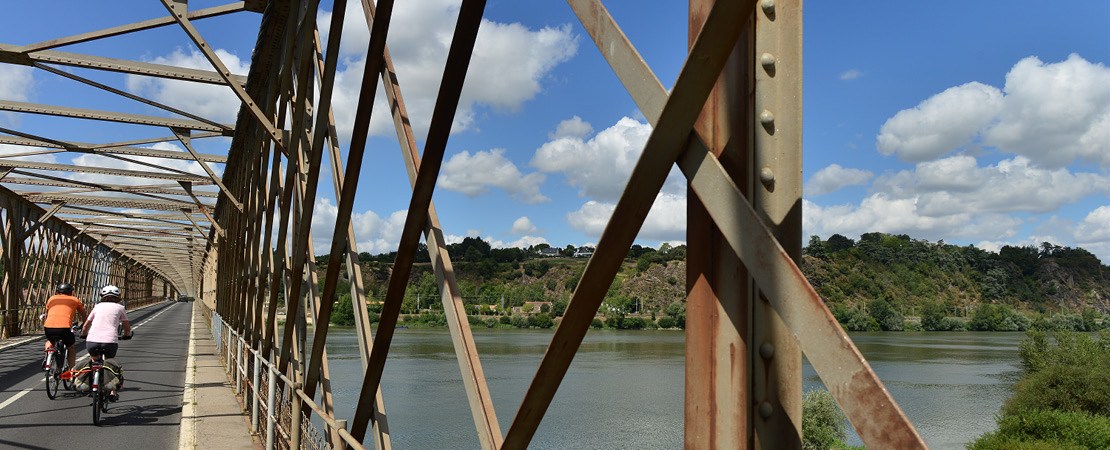
The Saint-Nazaire bridge
This giant bridge is 40 years old and still holds a record: that of the longest bridge in France with a length of 3,356 metres! It has no fewer than 72 stay cables which support the bridge and meet at the top of the 2 pylons 68 metres above the deck, 54 bridge piers, 3 traffic lanes, 2 cycle lanes (you are advised however to use the dedicated shuttles) and two walkways for pedestrians… in short, 17,000 tonnes of steel, 80,000m3 of concrete, and 8,980 cables which will take you from Saint-Brevin-les-Pins to Saint-Nazaire… Impressive!
